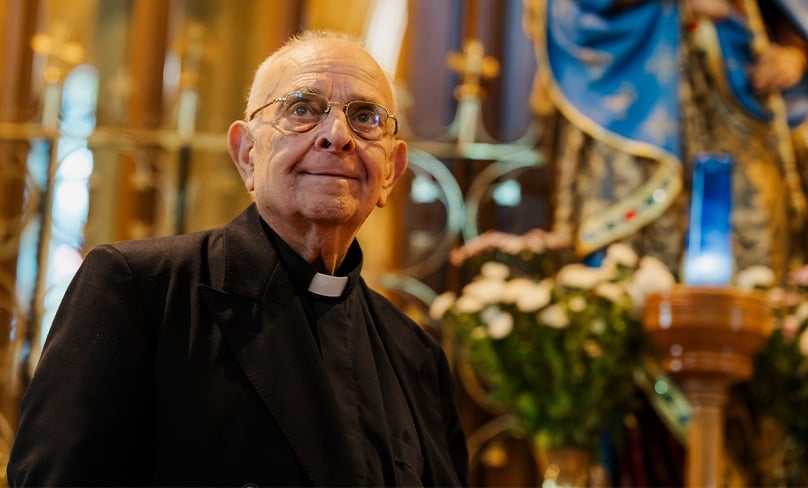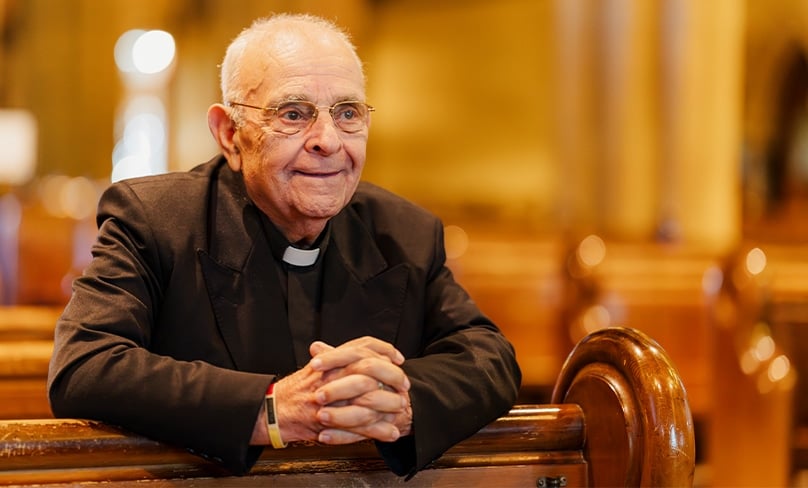
Fr John Iacono has helped to change countless lives for the better in Sydney and the Philippines and now in his 80s the quiet achiever still lends his support to the church’s mission.
While officially retired, the spiritual father is a fundraising powerhouse supporting the launch and ongoing support of dozens of apostolates in the Sydney archdiocese and in the Philippines archdiocese of Cebu with a special focus on young people and the poor-despite being officially retired.
In Cebu, thanks to Fr John, there is a day-care centre which today looks after around 220 children, a housing project building homes for 460 low-income families, an outreach program for the hearing impaired, chapels, shrines and many more.
In Sydney he is an indefatigable supporter of charitable works including the Retired Priest’s Fund which provides the financial means to care for the sick and retired priestly spiritual fathers, most of whom are more than 75 years of age.
Central to Fr John’s story is his relationship with his own father Antonio Iacono, beginning in Italy’s Aeolian Islands in the southern province of Messina, where he was born.
His earliest memories are of pretending to be a priest and celebrating “Masses” for his siblings at home, but Antonio would not approve of his son’s growing call from God.
In 1951, aged nine, John migrated with family members to Australia to join Antonio who had migrated two years earlier.
He arrived on 11 October, the feast of Our Lady of Lourdes and was enrolled in the Christian Brothers school in Burwood.
But when his father learnt that John wanted to become a priest he pulled him from the school and sent him to Drummoyne Public School instead.
“He thought the Christian Brothers were influencing me in that direction. He always said he would prefer to die or even to see me dead at his feet than see me a priest,” Fr John said.
“His only wish for me was as the first boy in our family to be married and have a grandson who would be named after him.
“It might be hard for people to appreciate but I understood where he came from, it was his culture.”
After completing school he helped his brother-in-law run a pair of milk bars and delicatessens in Drummoyne before joining the Scalabrini Fathers and becoming a priest at the age of 36.
“When his hopes for me didn’t eventuate my father kind of gave up his faith, because he felt he was cursed by God. He stopped going to church,” Fr John said.
“I could never go home for holidays while I was studying for the priesthood but I never held it against him and I always prayed for him.”
Antonio eventually reconciled with his son shortly before he died.
“He ordered everyone else to leave the room so that he could be with his son. It was the first time he had referred to me as his ‘son’ for a long time,” Fr John smiled.

“His last words were ‘John I love you, I bless you and I forgive you.’ But I always knew he loved me, deep down.”
On his ordination day his mother revealed that she had always prayed God would call him to priesthood.
“That is part of the mystery of my vocation. She made a pilgrimage on foot to the cathedral, seven kilometres away, and prayed before a statue of Our Lady to make her son or daughter a priest or a nun,” he said.
“It was on 28 August 1940, exactly 36 years before the day I became a priest and she had prayed every single day of my life for me to become a priest.”
When the Scalabrini Fathers opened a house in the Philippines Fr John was sent to minister there as a vocations director.
On a visit to the city of Cebu he was shocked by the conditions of a prison he encountered and asked for leave from his duties to minister there as a chaplain for two years.
“It was indescribable,” he said. “The building for 250 people was accommodating 2,500. There were no toilets, no showers, no water.
“They would be given one meal a day and the corruption in the system was appalling. They were human beings, treated like animals. For 45 years no chaplain had wanted to work there.”
Fr John’s superior didn’t give him permission to change his duties, so he asked to be released from the congregation and was welcomed by Cebu’s cardinal to work for his diocese in its prisons and other apostolates.
So began 25 years of transforming the lives of thousands on the island of Cebu, including many people living on a large landfill waste site where families scavenged for daily subsistence.
Fr John was shocked to find children as young as three years old being forced to search steaming mountains of garbage for recyclable waste to earn a few pesos to survive.
He says ministering in Cebu has been the highlight of his priesthood, but also loved serving in a number of Sydney parishes: St Joseph’s in Belmore, St Charles Borromeo in Ryde, St Columba’s in Leichhardt, and Enmore-Tempe parish. He’s also served as a chaplain at Royal Prince Alfred Hospital.
In Sydney he still raises funds to support the Good Shepherd Seminary, St Mary’s Cathedral restoration project, the Charitable Works Fund and the Priest’s Retirement Fund.
“But everything I have done I think is just a drop of water in the middle of the ocean and would not be possible without the people who support me,” he says.
“I was always impressed by St Mother Teresa of Calcutta, who I met twice: once in the Philippines and once here. She used to say it’s not so much what you achieve, it’s how much love you put into what you do.
“If you do something for self-interest, it only goes so far, but I think when love goes into it nothing is impossible. And if I hadn’t always had many people to support me I wouldn’t have been able to do anything at all.”
